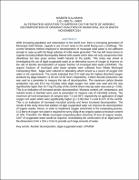| dc.description.abstract | With increasing population and urbanization in the world over, there is increasing generation of Municipal Solid Wastes. Uganda is one of such areas in the world facing such a challenge. The current Windrow method employed in decomposition of municipal solid waste is not sufficient enough to cope up with the large volumes of solid waste generated. This has left many towns in Uganda including Mbale Municipality littered with wastes which does not only compromise their cleanliness but also poses serious health hazards to the public. This study was aimed at investigating the use of algal oxygenated water as an alternative source of oxygen to improve on the rate of aerobic decomposition of organic fraction of municipal solid waste (OFMSW). The organic fractions of municipal solid waste samples were collected from Mbale Municipal Composting Plant. Algae were cultured in laboratory which served as a source of oxygen rich water in the experiments. The results indicated that 20.0 mg/l was the highest dissolved oxygen produced by algae between 11.00 and 15.00 hours respectively. Carbon dioxide production rate was used as a parameter to measure the rate of decomposition. The maximum carbon dioxide production rate was 62.6 mg CO2/day when algal oxygen rich water was used and this was significantly higher than 34.7 mg CO2/day of the control where only tap water was used (p < 0.05). This is an indication of increased aerobic decomposition. Moisture content, pH, temperature, and nutrient levels in leachate were used as parameters to measure rate of microbial activity. The maximum pH and temperature of compost were 7.5 and 46oC respectively on application of algal oxygen rich water which were significantly higher (p < 0.05) than 7.4 and 41.6oC of the control. This is an indication of increased microbial activity and hence increased decomposition. The results of this study show that addition of algal oxygenated water can improve the decomposition of organic wastes. Hence, in order to implement oxygen enrichment in the composting process, 0.12 liters of oxygen rich water is required for every 200g of dry organic wastes at moisture content of 10%. Therefore, for Mbale municipal composting plant receiving 70 tons of organic wastes, 42m3 of oxygenated water would be required; necessitating the construction of an algal pond of the dimensions 8.4m x 10m x 0.5m to provide such large amounts of water.
Key words: Aerobic decomposition, algal oxygenated water, OFMSW | en_US |

